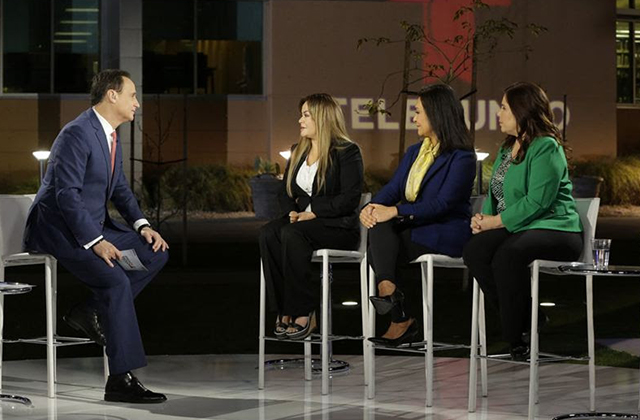Fear among immigrants—documented or not—is real right now. Will Immigration and Customs Enforcement (ICE) come to their workplace? Their homes? What if a police officer asks about their immigration status in a routine traffic stop?
Spanish-language network Telemundo answered all these questions and more in a special segment that aired yesterday (February 26) called “Conoce Tus Derechos,” or “Know Your Rights.” This is the network’s fifth news special following the election of President Donald Trump.
Filmed at East Los Angeles College, Telemundo anchor José Díaz-Balart hosted the news special and interviewed two panelists, immigration attorney and Telemundo contributor Alma Rosa Nieto and Angélica Salas, the executive director of the Coalition for Humane Immigrant Rights of Los Angeles. The special covered many aspects of immigrant rights, with dramatizations to give viewers an idea of what different interactions with ICE or other law enforcement look like.
Here’s a recap of what immigrants—documented or undocumented, at work or at home, Latinx or Asian or Arab or anything else—need to know.
When ICE comes to the workplace
ICE officials arrested more than 700 undocumented workers between 2008 and 2016 during workplace raids, reports CNN. Former Maricopa County Sheriff Joe Arpaio in Arizona used this tactic frequently and one of the women caught in his raids spoke during the Telemundo program. She described hiding from immigration officers and asked the panelists: Was it wrong of her to do that?
Their response to her broke down the dos and don’ts when la migra comes to your workplace.
When ICE shows up at your door
This is a scene straight out of many people’s nightmare, as Díaz-Balart described it—and a moment where things can easily go wrong. As he and the panelists emphasized, ICE officers often turn up the pressure during home visits.
That’s why it’s important for homeowners and residents to know their rights.
When police pull you over
The key takeaway here is that a police officer is not an ICE officer, and they shouldn’t be asking about your immigration status. In fact, some cities, including New York and and San Francisco, prohibit such questioning.
In the dramatization Telemundo aired, the officer impounded the driver’s car, but she was free to go because she exercised her right to remain silent. That’s one thing to keep in mind and the panelists explained others.
Have additional questions? Telemundo launched a website where people can find resources, including how to apply for citizenship, a green card, DACA and more. You can also read Colorlines’ recent piece, "How to Brace Yourself for an ICE Raid" for further insight.
